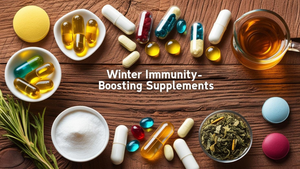
Winter Wellness Must-Haves immunity Boosters
With the cold winds and chilly mornings of idleness, the time to rev up your susceptible system is now to remain healthy and bright. A robust susceptible system is your body's shield against the onslaught of season's snap, flu, and other diseases. Here are some must-have immunity boosters to add to your daily routine during this idleness.
Vitamin D
usually named the" sun vitamin," Vitamin D plays a key position in managing the vulnerable reaction. During leisure time, when sunlight is scarce, one needs to focus Vitamin D to maintain circumstances optimal. Foods containing Vitamin D include adipose fish, milk that has been fortified with Vitamin D, and egg thralldom. also, use a day-to-day Vitamin D supplement to keep your vulnerable system strong.
Vitamin C
One of the best-known promoters of immunity, Vitamin C is a vital antioxidant that helps defend your cells against damage and boost white blood cell production. Orange’s, failures, and grapefruit are good to eat for their Vitamin C content. Strawberries, bell peppers, and broccoli also contain it. Eating these will build up your compromised defenses.
Zinc
Zinc is a mineral that is critical in maintaining the delicate system by enabling the product and function of delicate cells. Zinc also contains anti-inflammatory parcels that can facilitate the reduction of the stiffness of snap. Meat, shellfish, legumes, seeds, and nuts are some of the sources of zinc. Zinc supplements are also available and can be a great means of ensuring you get adequate amounts of this precious nutrient.
Omega- 3 Adipose Acids
Omega- 3 adipose acids are also well known for their anti-inflammatory packages that facilitate a healthy vulnerable response. They are essential fats that are built into adipose fish such as salmon, mackerel, and sardines. Factory- grounded forms are flaxseeds, chia seeds, and walnuts. Adding foods rich in omega-3 to your food plan will have your vulnerable system in excellent working condition.
Probiotics
Gut health is essentially a synonym for poor health, and probiotics are beneficial bacteria that support healthy gut foliage. Yogurt, kefir, sauerkraut, kimchi, and other fermented vegetables contain the probiotics. A healthy gut foliage will balance your poor system and more effectively allow your body to fight infection.
Elderberry
Elderberry is a grandma's remedy that's been utilized for centuries to maintain fragile health. It's full of antioxidants and contains antiviral bundles that'll come in handy to cut back the time and stiffness of snap and flu. Elderberry supplements, bathos, and teas are readily accessible and can be an amazing addition to your off time heartiness power.
Magnesium
Magnesium is an important mineral that is involved in more than 300 biochemical processes in the body, such as maintaining the vulnerable system. It is useful in reducing inflammation and is needed for optimal functioning of vulnerable cells. Leafy vegetables, nuts, seeds, whole grains, and dark chocolate are some of the magnesium-rich foods. icing you have acceptable magnesium conditions can contribute to your overall immunity.
Simply, having a strong vulnerable system off-season is the key to not getting sick. Incorporating these essential nutrients into your life and diet may aid in giving your body the proper care to continue to succeed all winter long. Flash back to consult with a healthcare expert to discuss any new supplements to ensure they are viable for your own personal use. Stay warm, stay healthy, and enjoy the downtime season with confidence!

The Benefits of Omega-3 Supplements for Heart Health
The Benefits of Omega-3 Supplements for Heart Health
Omega-3 fatty acids are essential nutrients known for their numerous health benefits, particularly in promoting heart health. Omega-3 supplements have gained popularity for their potential to reduce heart disease risk and support cardiovascular health. Our Omega-3 brands offer high-quality supplements designed to deliver these crucial nutrients effectively. Here are ten key points detailing the benefits of Omega-3 supplements for heart health.
Understanding Omega-3 Fatty Acids
Omega-3 fatty acids are polyunsaturated fats that play a vital role in maintaining overall health. The three main types of Omega-3s are alpha-linolenic acid (ALA), eicosapentaenoic acid (EPA), and docosahexaenoic acid (DHA). EPA and DHA, primarily found in fish oil, are particularly beneficial for heart health. These fatty acids are essential because the body cannot produce them on its own, necessitating dietary intake or supplementation.
Omega-3 Benefits for Heart Health
One of the most well-known Omega-3 benefits is its positive impact on heart health. Studies have shown that Omega-3 fatty acids can help reduce the risk of cardiovascular diseases by lowering blood pressure, reducing triglycerides, decreasing the risk of heart attack and stroke, and preventing arrhythmias. These heart-healthy supplements support overall cardiovascular function and improve the health of the heart and blood vessels.
Omega-3 Supplements and Cardiovascular Health
Regular intake of Omega-3 supplements can significantly enhance cardiovascular health. Omega-3 fatty acids help maintain the elasticity of blood vessels, reduce inflammation, and improve blood flow. These benefits contribute to better heart function and reduced strain on the cardiovascular system. For individuals at risk of heart disease, Omega-3 supplements can be a natural and effective preventative measure.
Fish Oil Benefits and Omega-3 Sources
Fish oil is one of the most common and potent sources of Omega-3 fatty acids. Rich in EPA and DHA, fish oil supplements provide a concentrated dose of these essential nutrients. Other Omega-3 sources include flaxseeds, chia seeds, walnuts, and algae. However, fish oil remains the most efficient source due to its high content of EPA and DHA, which are directly beneficial for heart health.
Reducing Heart Disease Risk
Omega-3 supplements are known for their potential to reduce heart disease risk. These supplements lower blood triglyceride levels, a significant risk factor for heart disease. They also help reduce LDL (bad) cholesterol while increasing HDL (good) cholesterol, improving overall lipid profiles. By addressing these risk factors, Omega-3 supplements play a crucial role in heart disease prevention.
Optimal Omega-3 Dosage
Determining the optimal Omega-3 dosage is essential for maximizing its heart health benefits. While individual needs may vary, general recommendations suggest an intake of 250-500 mg of combined EPA and DHA per day for healthy adults. Higher doses may be beneficial for individuals with existing heart conditions, but it is always advisable to consult with a healthcare provider before starting any supplement regimen to determine the appropriate dosage.
EPA and DHA: The Dynamic Duo
EPA and DHA are the two most important Omega-3 fatty acids for heart health. EPA primarily helps reduce inflammation and supports immune function, while DHA is crucial for maintaining cell membrane integrity and improving heart function. Together, these fatty acids provide comprehensive cardiovascular support, making them indispensable components of heart-healthy supplements.
Lowering Cholesterol and Blood Pressure
Omega-3 supplements have been shown to lower cholesterol and blood pressure, both critical factors in cardiovascular health. By reducing LDL cholesterol and raising HDL cholesterol, Omega-3s help prevent the buildup of plaque in the arteries. Additionally, their ability to lower blood pressure reduces the risk of hypertension, a major contributor to heart disease. These effects make Omega-3s a powerful natural remedy for maintaining a healthy heart.
Omega-3 and Triglycerides
High triglyceride levels are a known risk factor for heart disease. Omega-3 supplements are particularly effective in reducing triglyceride levels. Regular consumption of EPA and DHA has been shown to lower triglycerides by 15-30%, depending on the dosage. This significant reduction helps decrease the risk of cardiovascular events and supports overall heart health.
Anti-Inflammatory Effects of Omega-3
Inflammation plays a critical role in the development and progression of heart disease. Omega-3 fatty acids possess strong anti-inflammatory properties, helping to reduce chronic inflammation in the body. By lowering inflammation, Omega-3 supplements can prevent the hardening and narrowing of arteries, promoting better heart function and reducing the risk of cardiovascular diseases.
Conclusion
Omega-3 supplements offer a wide range of benefits for heart health, making them an essential part of a heart-healthy lifestyle. From reducing the risk of heart disease to lowering cholesterol and blood pressure, the positive effects of Omega-3 fatty acids are well-documented. Our Omega-3 brands provide high-quality supplements rich in EPA and DHA, ensuring you receive the best support for your cardiovascular health. Whether you’re looking to improve your heart function, reduce inflammation, or lower triglycerides, Omega-3 supplements are a valuable addition to your daily routine. By incorporating these heart-healthy supplements, you can take proactive steps towards maintaining a healthy heart and preventing cardiovascular diseases.



